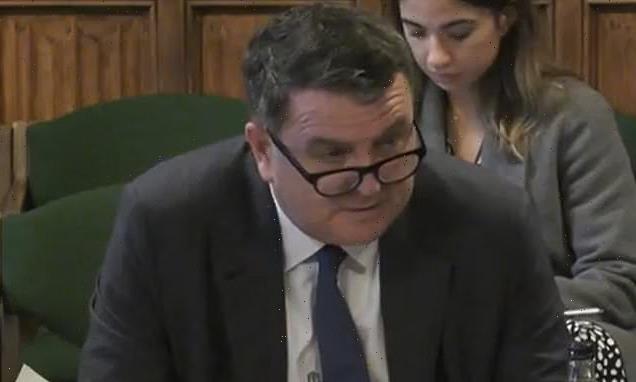Mel Stride hints state pension age could be INCREASED due to ‘pretty hairy’ state of public finances as Work and Pensions Secretary shies away from principle that Britons should spend one-third of their adult life in retirement
- Cabinet minister Mel Stride hints state pension age could rise after Govt review
- The Work and Pensions Secretary points to ‘pretty hairy’ state of public finances
- State pension age is currently 66 and will rise to 67 by 2028 for men and women
The state pension age could be raised due to the ‘pretty hairy’ state of the public finances, Cabinet minister Mel Stride has hinted.
The Work and Pensions Secretary told MPs an ongoing review of the age at which Britons become entitled to the state pension would be published within the next six months.
Mr Stride revealed that life expectancy rates, the cost of the state pension and ‘integenerational fairness’ were all factors being considered.
But he shied away from recommitting to a previous assessment that Britons should expect to spend around one-third of their adult life in retirement.
The state pension age is currently 66 for men and women and will rise to 67 by 2028, while the Government has previously it will then rise again to 68 by 2039.
But there has recently been speculation the rise to 68 could be brought forward to as early as 2033.
In his Autumn Statement this month, Chancellor Jeremy Hunt revealed the Government’s review of the state pension age would be published in ‘early 2023’.
Appearing before the House of Commons’ Work and Pensions Committee this morning, Mr Stride said the findings would be made public before May and ‘some time in the New Year’.
But, while the Work and Pensions Secretary acknowledged that an increase in Britons’ life expectancy rates had ‘flattened’ since a previous review of the state pension age, he declined to rule out a lengthening of people’s working lives.
Mel Stride told MPs an ongoing review of the age at which Britons become entitled to the state pension would be published within the next six months
‘There are various moving parts in assessing where we should go with the uprating of the state pension age,’ Mr Stride told MPs.
‘One of them is life expectancy and, more precisely, what proportion of your life should we expect people to have in retirement as opposed to not in retirement.’
‘Another is the cost.’
Mr Stride suggested that work done by the Office for Budget Responsibility to look at the possible state of the public finances in 50 years’ time was a guide to the increased costs to the Government of demographic change.
‘If you look at the consequences of us living longer and you look at that, for example, as expressed in the financial stability report the OBR produces every year… the cost of pensions being an element within that – it all gets pretty hairy,’ he told the committee.
Mr Stride also suggested the Government would look at ‘intergenerational fairness’ to consider ‘the split between how long somebody works to support those that are not working’.
‘I can’t say anything about it at the moment other than those are some of the elements I am looking at,’ he added.
‘But we will be coming forward with something to say in due course.’
Labour’s Debbie Abrahams noted how life expectancy is ‘flatlining’ and ‘actually going backwards’ in areas such as her Oldham East and Saddleworth constituency
Mr Stride was also tight-lipped on whether the Government would recommit to a previously-established principle that people should expect to spend up to one-third of their adult life in retirement.
In response to fellow Tory MP Nigel Mills, a member of the committee, the Cabinet minister refused to commit to the findings of an independent 2017 review by former CBI boss John Cridland.
He replied: ‘You’re ingeniously trying to draw me into where the thinking is going at the moment.
‘You’re right the Cridland review was suggesting 32 per cent as the ALIR – the percentage of your life in retirement.
‘So that is a factor to consider, but I can’t be drawn on what my thoughts are at this stage whether Cridland is about the right figure or not.
‘But clearly that metric is a very important metric.’
Labour’s Debbie Abrahams, another member of the committee, noted how life expectancy is ‘flatlining’ and ‘actually going backwards’ in areas such as her Oldham East and Saddleworth constituency.
Mr Stride acknowledged the increase in life expectancy rates had ‘flattened’ since the Cridland report.
Source: Read Full Article



